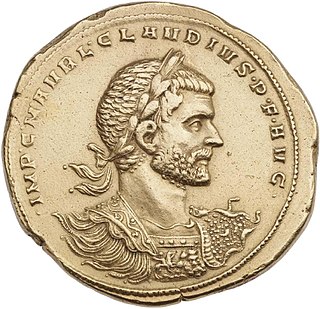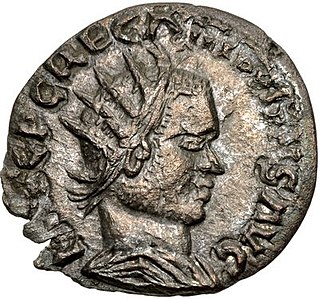Related Research Articles

Marcus Aurelius Claudius "Gothicus", also known as Claudius II, was Roman emperor from 268 to 270. During his reign he fought successfully against the Alemanni and decisively defeated the Goths at the Battle of Naissus. He died after succumbing to a "pestilence", possibly the Plague of Cyprian that had ravaged the provinces of the Empire.

Valerian was Roman emperor from 253 to spring 260 AD. Valerian is known as the first Roman emperor to have been taken captive in battle, captured by the Persian emperor Shapur I after the Battle of Edessa, causing shock and instability throughout the Roman Empire. The unprecedented event and his unknown fate generated a variety of different reactions and "new narratives about the Roman Empire in diverse contexts".

P. C. Regalianus, also known as Regalian, was Roman usurper for a few months in 260 and/or 261, during the Crisis of the Third Century, a period of intense political instability in the Roman Empire. Regalianus was acclaimed emperor by the troops along the Danube river, a region of the empire that frequently experienced barbarian raids, probably in the hope that he might be able to secure the frontier.
Licinius Valerianus Minor was the son of Roman emperor Valerian and his second wife Cornelia Gallonia, and half-brother of Gallienus.
Gaius Ceionius Rufius Volusianus was a Roman senator who had a lengthy political career and who was appointed consul at least twice, the known dates being AD 311 and 314.
Lucius Petronius Taurus Volusianus was a Roman citizen, apparently of equestrian origins, whose career in the Imperial Service in the mid-Third Century AD carried him from a relatively modest station in life to the highest public offices and senatorial status in a very few years. He may have secured his first appointments before the Licinian Dynasty – – acceded to the Empire in 253 AD, but it was in the course of their reign that his upward progress achieved an almost unprecedented momentum and the second factor seems to have been a consequence of the first. The nature of his relationship to the Licinii is uncertain, but it seems likely that a common origin in the Etruscan region of central Italy at least predisposed Gallienus in his favour and he seems to have been that emperor's most trusted servant and adviser during the period of his sole reign - 260(?)-268 AD.
Marinianus was Roman consul in the year 268, under Emperor Gallienus. He was related to the Egnatia gens and has been speculated to be the cousin, son or nephew of Emperor Gallienus. Marinianus and Valerianus Minor, were killed during the autumn of 268 in a purge of Gallienus' partisans.
Egnatius Lucillus was a Roman senator.
Virius Lupus was a consul of the Roman Empire in 278.
Aurelius/Iulius Marcellinus was a Roman soldier and Imperial functionary who had a brilliant equestrian career and was elevated to the Senate when he was chosen by the Emperor Aurelian as his consular colleague. His appointment as Consul is thought to have been a reward for his loyalty and steadfastness in 273 when, as Aurelian's deputy in charge of the eastern provinces of the Empire where the authority of the Imperial Government had only recently been restored, he resisted attempts to suborn him by a rebellious faction in the city of Palmyra.
Gaius Junius Donatus was a Roman politician, who was appointed consul twice, the second time in AD 260, during the Crisis of the Third Century.
Publius Cornelius Saecularis was a Roman politician who was appointed consul twice, first in around AD 240 and later in AD 260, during the Crisis of the Third Century.
Cassius Dio was a Roman senator who was appointed consul in AD 291.
Gaius Junius Tiberianus was a Roman soldier and senator who was appointed consul twice, first around AD 265, and then in AD 291.
Junius Tiberianus was a Roman senator who was appointed consul in AD 281.
Ovinius Gaius Julius Aquilius Paternus was a Roman senator who was appointed consul in AD 267.
Ulpius Limenius was a Roman politician who was appointed consul in AD 349.
Afranius Hannibalianus was the consul of 292 AD, a praetorian prefect, a senator and a military officer and commander.
Arcesilaus was a Roman senator who was appointed consul in AD 267.
Marcus Nummius Albinus was a Roman senator who was appointed consul twice, first as a suffectus sometime around AD 240, and secondly as an ordinarius in AD 263.